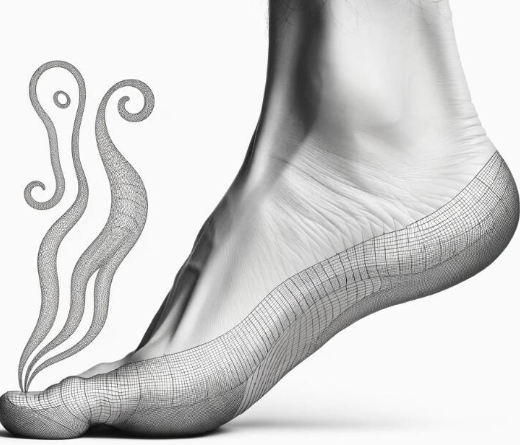
How to Make Your Feet Not Smell?
Having smelly feet can be embarrassing and annoying. But the good news is there are many ways you can help eliminate foot odor and keep your feet fresh. With some simple daily habits and foot care routines, you can nip smelly feet in the bud.
Understand What Causes Foot Odor
Before covering how to make feet not smell, it helps to understand what causes foot odor in the first place. There are a few main culprits:
- Sweat – Excessive sweating of the feet makes them damp and creates the perfect environment for bacteria to thrive. This bacteria breaks down your sweat and causes unpleasant odors. People with hyperhidrosis (excessive sweating) are especially prone to sweaty smelly feet.
- Bacteria and Fungi – The most common bacteria found on our feet is called brevibacterium. This bacteria feeds on dead skin cells and sweat and produces foot odor as a byproduct. Fungi like athlete’s foot can also grow on the feet and contribute to smelliness.
- Socks and Shoes – Tight, non-breathing footwear traps sweat and bacteria against your feet, allowing smells to build up quickly. Certain shoes like sneakers absorb odors and make it worse. Wearing the same shoes day after day means odors can’t air out.
- Skin Conditions – Issues like fungal infections or bacterial overgrowth can cause increased foot odor. Cracked skin and dryness also make feet more smelly by creating crevices for bacteria to multiply.
Practice Proper Hygiene
Practicing good foot hygiene is the first line of defense against smelly feet. Make sure to:
- Wash Feet Daily – Wash your feet with antibacterial soap and rinse thoroughly every day, especially between the toes where sweat and bacteria accumulate. Consider using a washcloth or scrub brush to remove dead skin.
- Dry Properly – Dry your feet thoroughly after washing, including between toes. Dampness encourages odor-causing bacteria to thrive.
- Exfoliate Regularly – Use a foot scrub or pumice stone 1-2 times per week to slough off dead skin cells and calluses where smells collect. Focus on callused heels and balls of feet.
- Clip Toenails – Keep toenails trimmed straight across to prevent ingrown nails and allow shoes and socks to fit properly.
- Change Socks Daily – Wear clean, breathable socks made of natural materials like cotton. Never wear the same socks 2 days in a row.
- Use Foot Powder – Dust antibacterial foot powder on feet and in shoes to help absorb moisture and control odor. Arrowroot and cornstarch powders also work.
Wear Proper Footwear
Choosing the right footwear can help minimize foot odor issues:
- Rotate Shoes – Rotating 2-3 pairs of shoes allows them to fully air out and dry between wears. Consider removable insoles to take out between wears.
- Wear Breathable Materials – Select shoes made of leather, canvas, mesh or other breathable materials. Avoid plastic and synthetic materials that don’t allow ventilation.
- Use Odor-Fighting Insoles – Insoles with charcoal, baking soda or other odor absorbers help reduce smells. You can also use insole deodorant sprays.
- Try Antibacterial Socks – Seek out socks with antibacterial properties, like those treated with silver nanoparticles. This inhibits bacteria growth.
- Go Barefoot When Home – Kick off your shoes when home to give feet a break and let them air out. Just be sure to wear clean socks.
- Disinfect Shoes – Use UV shoe sanitizers or disinfectant sprays to kill bacteria lurking in your shoes. Remove insoles and wash separately.
Soak Feet to Reduce Odor
Soaking your feet helps soften calluses, soothe soreness and tackle foot odor. Try these soak solutions:
- Epsom Salt – Epsom salt has antibacterial and anti-fungal properties to counteract odor-causing bacteria and skin conditions. Add 1⁄2 cup to a foot bath.
- Baking Soda – The alkaline environment baking soda creates inhibits bacteria growth that causes smells. Mix 4 tablespoons in warm water.
- Apple Cider Vinegar – Apple cider vinegar makes feet less hospitable to fungus and bacteria due to its acidic properties. Add 1 part vinegar to 2 parts water.
- Essential Oils – Oils like eucalyptus, peppermint, tea tree and thyme have antimicrobial action against odor-causing bacteria. Add several drops to a basin of water.
- Black Tea – The tannins in black tea have an antibacterial effect that helps neutralize odors and freshen feet. Steep 2 bags in hot water.
Soak feet for 15-20 minutes, then be sure to thoroughly dry them, especially between the toes.
Consider Antiperspirants and Deodorants
If excessive foot sweating and odor persists, over-the-counter antiperspirants and deodorants can help. Look for aluminum chloride as the active ingredient. Apply before bed so the products can fully absorb while you sleep. Be aware these products may irritate sensitive skin. Other options are prescription-strength antiperspirants. Talk to your doctor if OTC products don’t provide relief.
Know When to See a Doctor
Schedule an appointment with your doctor if at-home care doesn’t reduce foot odor, or if smells worsen or become intolerable. Uncontrolled foot odor could signal issues like fungal infections or bacterial overgrowth that require prescription medication to clear up. You should also see a doctor for any of the following:
- Cracked, peeling or broken skin on feet
- Discharge, bleeding, excessive dryness or other irritation
- Discolored nails or unusually thick nails
- Visible fungal infections like athlete’s foot
- Unusual warmth or redness in feet
With diligent foot hygiene, breathable shoes, targeted soaks and medical care when needed, you can keep your feet fresh and odor-free. Don’t resign yourself to smelly feet – take control with these proven tips.



